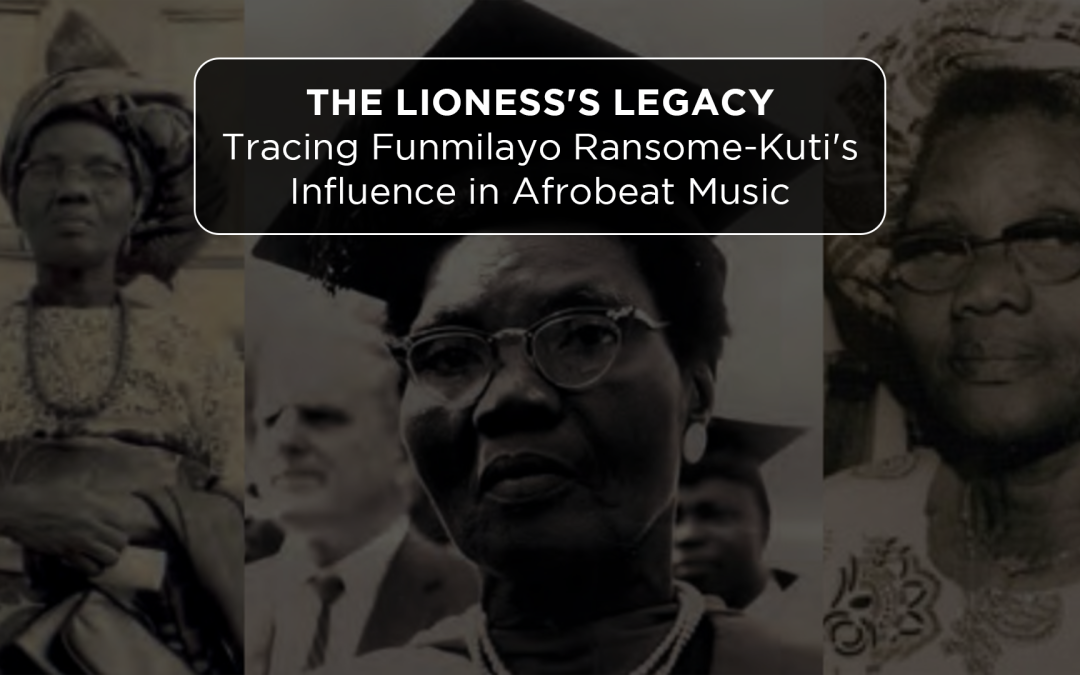Introduction
Hey, music lovers and history buffs! Ever wonder about the roots of Afrobeat and the powerful stories behind its rhythm? Well, you’re in for a treat. Let’s dive into the life of Funmilayo Ransome-Kuti, a monumental figure in Nigerian history, and uncover how her indomitable spirit and activism echo through the vibrant sounds of Afrobeat music today. Get ready for a journey through time, from colonial Nigeria to the global stages of Afrobeat.
Funmilayo Ransome-Kuti: The Matriarch of Activism
Early Life and Political Awakening
Born in colonial Nigeria, Funmilayo Ransome-Kuti wasn’t just any woman; she was a firebrand, a revolutionary who would become the mother of Afrobeat. Her life was a testament to the fight for independence, women’s rights, and social justice.
Fighting for Women’s Rights and Independence
Her activism wasn’t confined to the drawing rooms of the elite; it spilled onto the streets, into the marketplaces, rallying women to demand their rights and fight colonial rule.
The Birth of Afrobeat
Fela Kuti: A Son’s Musical Rebellion
It was from this environment of activism and resistance that Fela Kuti, Funmilayo’s son, would emerge as the pioneer of Afrobeat, a genre that would not only define Nigerian music but also become a global phenomenon.
Afrobeat: More Than Just Music
Afrobeat was more than music; it was and continues to be, a movement. Fela’s music was imbued with the spirit of his mother’s activism, turning Afrobeat into a platform for social and political commentary.
Echoes of Activism in Rhythms
Lyrics of Liberation
The beats of Afrobeat carried within them the echoes of liberation, the struggle for independence, and the fight against oppression – themes deeply influenced by Funmilayo’s activism.
The Political Pulse of Afrobeat
Fela used his music to challenge the status quo, much like his mother challenged colonial rule, making Afrobeat a rhythmic counterpart to political activism in Nigeria.
Funmilayo’s Legacy in Fela’s Music
Inspirational Anthems
Songs like “Zombie” and “Beasts of No Nation” were not just musical tracks; they were anthems of resistance, inspired by the legacy of struggle and activism Funmilayo Ransome-Kuti left behind.
A Family of Fighters
The Kuti family’s legacy of fighting for social justice didn’t end with Funmilayo or Fela. It continued with Femi and Seun Kuti, keeping the flame of activism alive through their music.
The Global Spread of Afrobeat
From Lagos to the World
Afrobeat has transcended its Nigerian roots, becoming a global soundtrack for resistance and empowerment, spreading the messages Funmilayo championed to every corner of the world.
Contemporary Afrobeat Artists and Activism
Today, artists like Burna Boy and Wizkid draw on the themes of empowerment and resistance that Funmilayo embodied, using their music to advocate for social change.
Women in Afrobeat
The Role of Female Voices
The influence of women in Afrobeat, particularly the legacy of Funmilayo Ransome-Kuti, continues to be a driving force in the genre, empowering female voices in the industry.
Continuing Funmilayo’s Fight
The themes of women’s rights and independence that Funmilayo fought for continue to resonate in the music and activism of contemporary female Afrobeat artists.
The Cultural Impact of Afrobeat
A Platform for Social Change
Afrobeat has become more than a genre; it’s a platform for advocating for change, inspired by the legacy of activists like Funmilayo.
Music as a Form of Resistance
The beats of Afrobeat continue to be a powerful form of resistance against oppression, echoing Funmilayo Ransome-Kuti’s lifelong fight for justice and equality.
The New Generation
Femi and Seun Kuti: Keeping the Flame Alive
Femi and Seun Kuti, Funmilayo’s grandsons, have taken up the mantle, continuing to use Afrobeat as a medium for social commentary and activism.
Innovators and Legacy Bearers
The new generation of Afrobeat artists are not just musicians; they are innovators and bearers of Funmilayo’s legacy of activism.
Afrobeat Today
Global Influences and African Identity
Afrobeat today is a global phenomenon, yet it remains deeply rooted in the African identity and struggles, reflecting the global influence of Funmilayo’s activism.
The Future of Afrobeat
As Afrobeat continues to evolve, it carries with it the spirit of resistance and activism that Funmilayo Ransome-Kuti embodied, promising a future where music continues to be a force for change.
Preserving Funmilayo’s Legacy
Educational Initiatives and Musical Tributes
The legacy of Funmilayo Ransome-Kuti is preserved not only in music but also in educational initiatives and tributes that continue to inspire and enlighten.
The Role of The New Afrika Shrine
The New Afrika Shrine, established by the Kuti family, serves as a living memorial to Funmilayo’s legacy, hosting events that celebrate her life and the values she fought for.
Conclusion
The journey from Funmilayo Ransome-Kuti’s activism to the pulsating beats of Afrobeat is a testament to the power of music as a vehicle for change. Her legacy, intricately woven into the fabric of Afrobeat, continues to inspire and mobilize. As we celebrate the sounds and stories of Afrobeat, let’s remember the lioness whose roar ignited a musical revolution.
FAQs
- Who was Funmilayo Ransome-Kuti? A pioneering Nigerian women’s rights activist, teacher, and political leader, known as the mother of Fela Kuti, the Afrobeat legend.
- How did Funmilayo influence Afrobeat music? Through her activism and leadership, she inspired her son Fela Kuti, who infused his music with themes of resistance, liberation, and social commentary.
- What is Afrobeat, and why is it significant? Afrobeat is a genre that combines traditional Nigerian music, jazz, highlife, and funk, with lyrics often addressing social and political issues, making it a powerful form of cultural expression and activism.
- How are contemporary Afrobeat artists influenced by Funmilayo’s legacy? Many draw on her themes of empowerment, resistance, and social justice, using their platform to advocate for change, much like Funmilayo did.
- What can we learn from Funmilayo Ransome-Kuti’s life and legacy? Her life reminds us of the impact of steadfast activism, the importance of fighting for human rights, and the transformative power of music in societal change.


